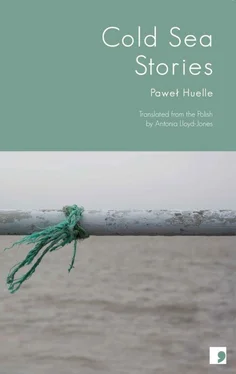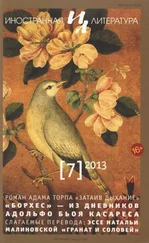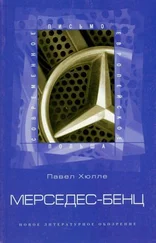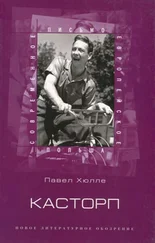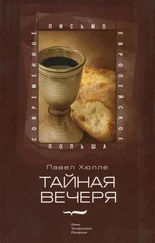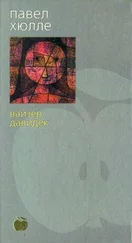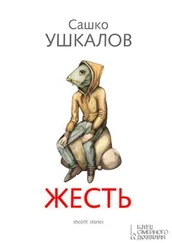But the road was deserted. Around the bend, when the familiar roofs of the houses and the rectangular block of the chapel disappeared from view, Jakub stopped to empty his bladder.
The golden stream carved deep grooves in the snow and melted the ice, until finally it broke through to the earth in a small corridor, at the bottom of which lay one of last year’s grey pine cones.
One final time he looked behind him, now regretting the forceful, impulsive words he had spoken in parting. Perhaps he was free to say: ‘And why do you talk such nonsense? No Messiah, neither yours nor mine, is ever going to appear!’ But did he have to add at once in a harsh, sneering tone: ‘We can only save ourselves – can’t you understand that?’ Now this remark was weighing him down like unnecessary baggage that he had to keep lugging around with him, like a stone put into his bundle. At last, when the dusk had laid long, purple shadows on the dingy grey snow, Jakub reached the spot where the road emerged from the forest.
The narrow-gauge railway line was buried in snow, and on the platform – where, apart from a signboard with an illegible name, there was a wooden hut – lay a dead horse. Someone had cut a few long strips of meat from the corpse, and the rest must have been torn at by the hungry dogs of passing refugees, for several days at least. Along the tracks, which he followed onwards, he came across various abandoned items: a coffee mill, an army knapsack, a child’s sledge, a chamber pot, a travel rug full of holes, and then, as he passed deserted or burned-down houses, he found some abandoned bodies. Some in uniforms, others in civilian clothes; they stared at Jakub in amazement, as if asking him if he were really the victor. The living did not have this boldness: too horrified by their own catastrophe, silent, meek and obsequious, they dropped their gaze and answered in monosyllables.
Only two days later, once in the suburbs, did Jakub run into a Russian patrol. When instead of documents he showed the number tattooed on his arm, the officer gave orders to let him through. The city reeked of burning, a corpse-like odour, early spring, the grease of armoured cars, wet dog fur, plunder, field-hospital carbolic, cheap tobacco, dust, blood, rape and hooch, and something indeterminate as well, something mysterious that Jakub only recognised and was able to name a while later, as he revolved like a beetle, wandering the chasms of burned-out streets. It was the very fine dust of Gothic bricks. Rising above the ruins of port warehouses, churches and tenements, it drilled into his nose and crept under his clothing; when he sat down on the melting snow it got into his hair too, tingeing it with the red glow of still smouldering embers.
For a couple of hours Jakub roamed the gloomy labyrinth. It looked as if the address he had memorised was out of date, something that belonged to a different city. Finally he found the alley: two surviving houses amid the rubble. In the courtyard, behind the chestnut tree next to the cast-iron pump, he turned through the gate and went up the staircase that creaked with age, to the first floor. A smell of overcooked turnips floated from the cellars to the roof, and in the blink of an eye, from somewhere in the deepest recesses of his memory, the dull but unique flavour of prison-camp soup came back to him. He knocked bashfully, but heard no response at all from inside the flat.
Sure he wouldn’t find anyone here, he took the letter from his pocket. The envelope was fat, but the slot with a flap and a sign saying Briefe was not that wide at all. As he was struggling with it, he was surprised to feel that someone’s hands – on the other side of the door – were helping him. Once the parcel had disappeared through the slot, Jakub knocked again. A chain grated, the door opened a fraction, and he saw Hanna. He had imagined the older sister quite differently. They were similar, of course, but if physical features had relevance here, it was secondary. Once she had reluctantly shown him into the living room, he closely watched her hand movements, the tilt of her head, and the look in her eyes as she read.
‘So you were there for all that time?’ she said, looking up from the page.
He started to regret not having read the letter. What did she mean by ‘there’? Without speaking, he shrugged his shoulders flippantly. But for now she didn’t ask any more questions. The sentences in her monologue, long and not very clear, in which the distant past was mixed with the events of recent days, were as tiresome as the March dusk, which was just falling outside. What did he care about the death of Ludwig, a couple of months ago, on the heroic front? Or her fears about what she would do when the Russians handed this city over to the Poles? Her concerns about her younger sister did not sound very sincere. Nor did the comments she threw in here and there about the atrocities of war, which she must have been making on his account. He wanted to leave now, but at that she took offence: wasn’t her sister’s request sacred to her? Besides, it was the curfew now and the Russians shot without warning.
‘There’s a room here that’s perfect for you,’ she said. ‘Can you speak Polish at all?’
He nodded, which could have meant: ‘Yes, very well,’ but instead of confirming the gesture verbally, he asked if her sister had said anything in her letter about Ludwig.
‘About Ludwig?’ she asked in surprise. ‘Why should she? She writes about you, almost the entire letter, didn’t she tell you?’
He was embarrassed. Especially when Hanna cast her eye over her sister’s screed again and asked him: ‘Do you love her? Did it come to intimacy between you?’
And when he said nothing, at once she added: ‘Don’t be offended, I’m modern, and it’s best to be straight about things like that, isn’t it? Do you think they’ll return from resettlement? She tells me she’s going to wait until autumn, and then she’ll come here, to the city, and she hopes to meet up with you. It’s lovely that you’ve made an arrangement – am I to understand she’s all alone there now? Yes, she always was brave. You probably don’t know this, but when my people excommunicated me, she was the only one who came to see me. My God, it all seemed so simple then. But now?’
Over supper Jakub told Hanna he wanted to go abroad. Maybe in a few months’ time there’d be liners setting sail from here? And if not, he was still determined to travel, even via Germany. He had an uncle in America; he would find him, and over there, on the other side of the Atlantic, he would start a new life. Because here, on the old continent, someone would always be wanting to excommunicate someone else, capture cities and burn down houses.
Hanna was watching Jakub with discreet curiosity. Whenever he grew excited and spoke a little faster, sparks flashed in his eyes. It took her a while to notice the astonishing similarity: Jakub’s face, and the face in the holy picture given her by the parish priest, were literally identical. Just as if her guest had posed for the unknown artist. Of course it was impossible, but it made her feel the oddness of the situation all the more. Jakub caught the glance with which was she unknowingly steering his gaze towards the wall. Between a wedding photograph and a picture of Ludwig, A Holy Baptism Souvenir was hanging in a golden frame. Jesus had his hand raised, and his transfigured body was shining with the glow of an unearthly light.
‘Now I understand why you keep looking at me like that,’ said Jakub, laughing.
She didn’t answer, so at once he added: ‘I never saw any icons there in the chapel, or in the houses.’
‘They regard them as a sin,’ she said, sighing. ‘Anyway, to them everything is sinful and immoral. They say they are emulating God. But can man even attempt such a thing? They’re aiming too high! Their life is a torment, because when they don’t succeed, they are cruel – please believe me, I’ve been on the receiving end of it.’
Читать дальше
